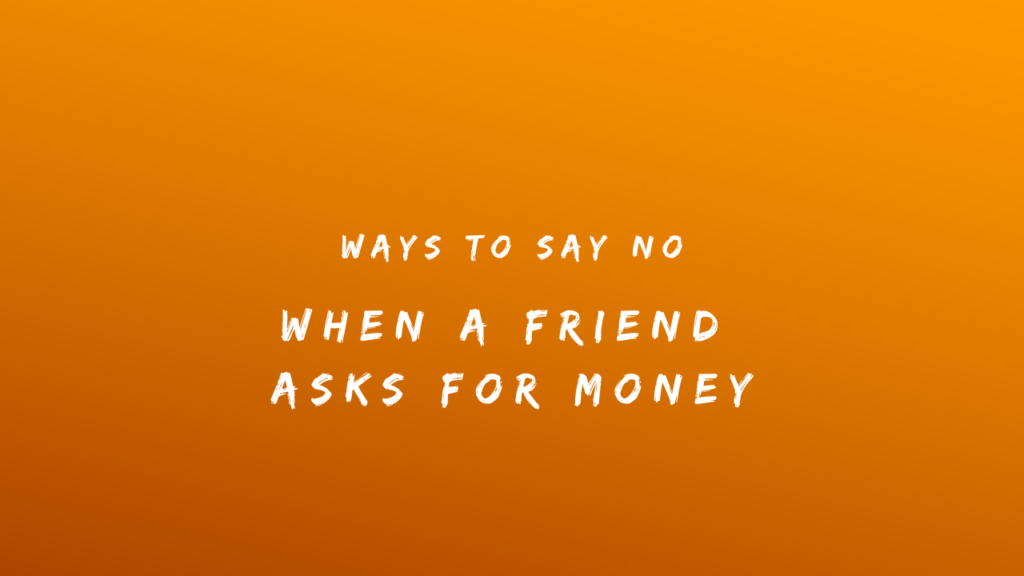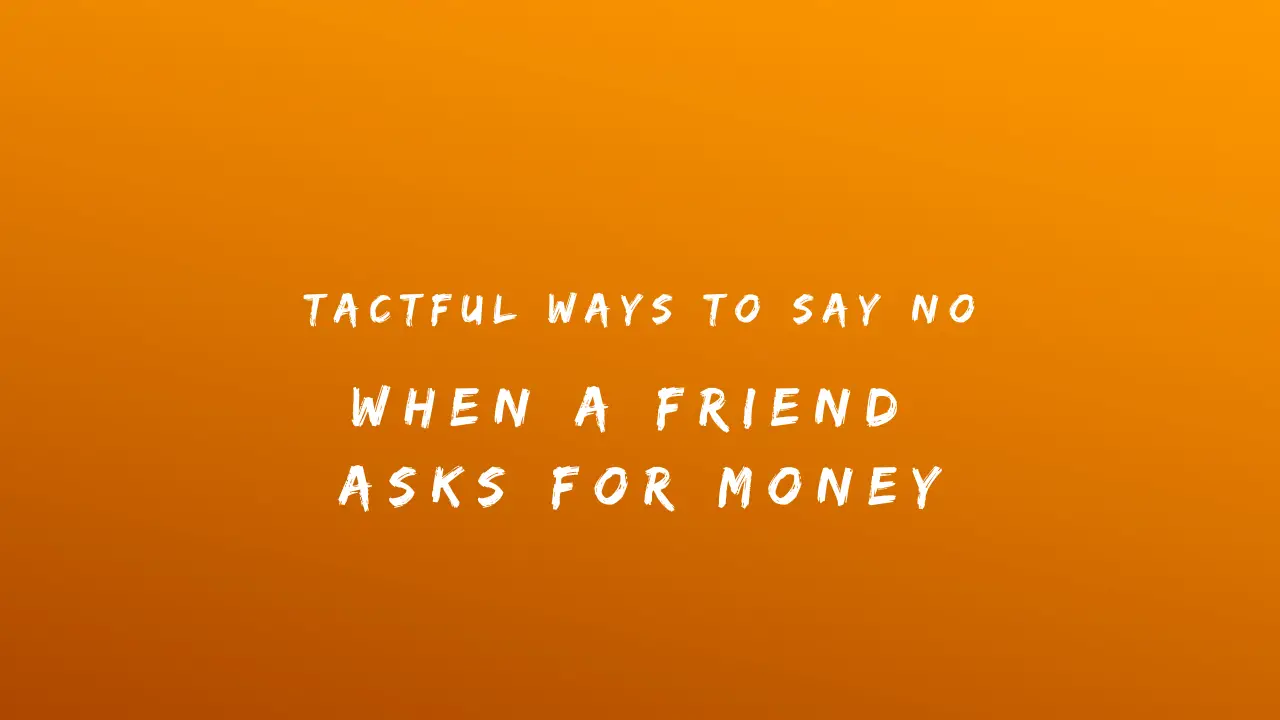Navigating friendships can be tricky, especially when money is involved. When a friend asks for money, you can be in a tight spot. You want to help, but you also need to protect your financial well-being. Learning to say no gracefully is essential for maintaining healthy boundaries and ensuring that your friendship and finances remain intact.
Understanding the Situation
Before you respond, take a moment to understand the full picture. Is your friend facing a temporary setback or a recurring issue? Knowing their financial needs can help you decide how to proceed. Similarly, assess your financial situation. Are you able to lend money, or would it strain your resources? This clarity will guide your response.
Communicating Effectively
The way you communicate your decision can make a huge difference. Choose a time and place to have a calm, uninterrupted conversation. Your approach should be clear and compassionate to avoid misunderstandings and hurt feelings.

150+ Ways to Say No When a Friend Asks for Money
Direct and Honest
- I’m sorry, but I can’t lend you money now.
- Unfortunately, I’m not in a position to help with money.
- I wish I could help, but I have to say no this time.
- I don’t have the financial flexibility to assist you at the moment.
- Honestly, I can’t lend you any money right now.
- I’m afraid I have to decline your request for financial help.
- My current situation doesn’t allow me to offer you money.
- I can’t provide financial support at this time, unfortunately.
- I’m not able to give you the money you’re asking for.
- I hope you understand, but I must refrain from lending you money.
Personal Financial Boundaries
- I’ve set strict limits on my spending, and I can’t go beyond that.
- I have a budget I’m sticking to, so I can’t lend you any money.
- I’m managing my finances carefully, so I can’t provide financial support.
- I cannot lend money as I’m keeping a tight budget.
- I’ve allocated my funds for specific needs and can’t assist with yours.
- My financial commitments are already set, and I can’t divert funds now.
- I must stay within my financial boundaries and can’t offer you money.
- I’ve planned my expenses carefully and can’t extend any financial help.
- I cannot offer financial assistance as I’m following a strict budget.
- I must adhere to my financial limits, and I can’t provide the help you need.
Offering Non-Financial Help
- I can’t help with money, but will help you find other resources or options.
- While I can’t lend you money, I’m here to support you in other ways if you need it.
- I can’t offer you financial help, but let me know if there’s anything else I can do for you.
- I can’t provide you with money, but I can help you brainstorm other solutions.
- Although I can’t assist financially, I’m more than willing to offer advice or support.
- I cannot lend you money, but I can help you research alternative options.
- Money isn’t something I can offer, but I’m here to help you figure out a plan.
- I wish I could help with money, but I’m happy to support you in other ways.
- I cannot lend you money, but let’s explore other possibilities together.
- While financial support isn’t possible from me, I can help you with other resources or ideas.
Suggesting Alternatives
- Have you considered applying for a loan or seeking assistance from a local charity? They might be able to help.
- There could be a community resource or program that could offer support for your situation.
- I can’t provide money, but there are financial aid services that can assist you.
- To raise the funds you need, consider exploring other options, such as a part-time job or freelance work.
- How about looking into budgeting or financial planning tools? They could help you manage your expenses better.
- You might find some help through a crowdfunding platform. It’s a great way to raise funds for personal needs.
- Have you tried contacting family or other friends who might be better positioned to help?
- Some non-profit organizations offer financial assistance; they could be a good resource for you.
- Consider discussing your situation with a financial advisor—they can offer practical advice and solutions.
- Exploring government assistance programs could also be an option for you right now.
Setting Boundaries
- I have a personal rule about not mixing money with friendships, so I can’t help in this way.
- I’ve decided not to lend friends money to avoid potential issues, so I must pass this time.
- I must separate my finances from personal relationships, so I can’t assist with this request.
- I must stick to my boundaries and not provide financial help to friends.
- I’ve found that lending money to friends can complicate things, so I have to say no.
- To maintain a healthy relationship, I avoid lending money to friends.
- I’ve decided not to give out loans and must stick to that.
- For personal reasons, I can’t mix money with friendships, so I won’t be able to help.
- I prefer to keep my finances private and not lend money to friends.
- I need to maintain clear boundaries around money, so I can’t offer financial help.
Personal Values or Principles
- I believe in keeping finances separate from friendships to avoid complications, so I can’t help with money.
- My values guide me to avoid lending money to friends, and I must adhere to that.
- I’m committed to not mixing money with personal relationships, as it aligns with my principles.
- I have a principle of not involving money in friendships and must respect that guideline.
- I think it’s important to maintain clear boundaries regarding finances and friendships, but I can’t help.
- For me, it’s important to uphold my values about not lending money to friends.
- My values lead me to avoid financial transactions with friends, so I cannot assist.
- I believe in managing money separately from personal connections, so I can’t lend you money.
- Sticking to my principles means I must decline your financial help request.
- I believe that mixing money with friendships can lead to issues, so I can’t support you financially.
Previous Commitments
- I’ve already allocated funds for other important expenses, so I can’t help you now.
- I have financial commitments that I need to keep, so I can’t lend you money at this time.
- My budget is fully committed to other priorities, and I can’t divert funds to assist you.
- I’ve planned out my finances and can’t offer any additional support.
- I’m currently tied up with existing financial obligations, so I cannot help.
- I’ve already set aside my funds for other needs, so I can’t assist with this request.
- My current financial commitments prevent me from lending you money.
- I’ve committed my resources elsewhere, so I can’t provide financial support.
- I need to honor my previous financial arrangements, so I can’t offer you money.
- My financial plans are already in place, and I can’t make any adjustments to help out.
Future Possibility
- I can’t help with money right now, but I might be able to someday.
- I cannot assist financially now, but let’s see how things are later.
- I hope things improve soon so that I can help in the future.
- While I can’t offer support now, I’m open to revisiting this if my situation changes.
- I can’t provide financial help right now, but let’s discuss future possibilities.
- I could maybe help out down the line, but for now, I can’t offer financial support.
- I can’t assist now, but I’ll keep you in mind if my circumstances change.
- It’s not feasible for me to help right now, but let’s check in later to see if that changes.
- I can’t lend you money now, but I hope to be able to someday.
- I can’t provide financial assistance right now, but let’s stay in touch and see if I can help later.
Emotional Response
- I feel uncomfortable with lending money, so I can’t help.
- It’s hard to say no, but I cannot offer financial support.
- I’m overwhelmed by my financial situation and can’t assist right now.
- I’m struggling with my financial stress and can’t take on additional commitments.
- I care about you, but I’m not in a place emotionally where I can lend you money.
- Turning you down is tough, but I must say no to lending money.
- I’m dealing with some personal financial issues and can’t offer any help now.
- I feel conflicted about this, but I must be honest and say I can’t help with money.
- I wish I could help, but I need more time to lend money.
- It’s hard to say this, but I cannot lend you money due to my emotional stress.
Reiterating Friendship Value
- Our friendship means a lot to me, and I want to avoid mixing money with it, so I can’t help financially.
- I value our relationship and think keeping money from the equation is best.
- I don’t want finances to complicate our friendship, so I need to say no to lending money.
- I care about our friendship, and keeping it separate from financial matters is important.
- Our bond is important to me, and I want to preserve it by not getting involved in money issues.
- I’m concerned that lending money might affect our friendship, so I must pass on this request.
- I’d rather not risk putting any strain on our friendship by mixing it with financial matters.
- For the sake of our relationship, I prefer to avoid lending money.
- I want to maintain the strength of our friendship by not getting into financial transactions.
- Our friendship is too valuable to risk over financial issues, so I can’t help with money.
Health or Wellness Reasons
- I’m currently focusing on my well-being and can’t handle additional financial stress.
- I’m dealing with some health issues and need to prioritize my financial stability.
- My current health situation makes it difficult for me to help with money.
- I’m managing my wellness and financial health, so I can’t provide financial support.
- I’m working through some personal challenges and can’t handle lending money right now.
- I can’t afford to give money for my peace of mind and health.
- I’m focusing on my financial and emotional wellness, so I can’t assist you financially.
- My health requires me to be cautious with my finances, so I can’t lend you money.
- I prioritize my well-being and can’t take on any additional financial responsibilities.
- I’m managing some health concerns and must keep my finances in check, so I can’t help.
Confidentiality Concerns
- I prefer to keep financial matters private and not mix them with personal relationships.
- For privacy reasons, I avoid handling money transactions with friends.
- I’m uncomfortable discussing or dealing with financial issues within personal relationships.
- I think it’s best to keep financial matters separate from our interactions.
- I can’t lend you money to maintain confidentiality and avoid potential complications.
- I prefer not to get involved in financial dealings with friends to protect our privacy.
- I believe it’s important to keep financial matters discreet and separate from our friendship.
- I’m uncomfortable mixing finances and personal relationships, so I must say no.
- To respect our privacy, I prefer not to engage in financial transactions.
- For confidentiality reasons, I can’t assist with money and would rather keep our relationship separate from financial matters.
Practical Constraints
- I’m currently facing some financial constraints, so I can’t offer you any help.
- My budget is tight, so I can’t lend you any money.
- I have some financial limitations at the moment, which means I can’t assist with this request.
- I work within a strict financial plan and can’t provide additional support.
- I’m not in a position to help financially due to my practical constraints.
- I’ve got some financial constraints of my own that prevent me from lending money.
- My financial situation is limited, so I can’t offer financial assistance.
- I’m dealing with budgetary issues and can’t help you financially.
- Given my current financial constraints, I cannot provide the support you’re asking for.
- My financial situation restricts me, and I can’t offer any help now.
Previous Experiences
- From past experiences, I’ve found that lending money to friends can create complications, so I need to decline.
- I’ve had some difficult experiences with money and friendships before, so I’ve decided not to lend money.
- Based on my past experiences, I’ve learned that it’s best to avoid lending money to friends.
- My previous experiences have shown me that keeping finances separate from friendships is better.
- I’ve had issues when I lent money, and want to avoid repeating that situation.
- From previous situations, I’ve learned that it’s best to say no to lending money to friends.
- I’ve experienced complications before with financial help, so I need to stick to my policy of not lending money.
- Past experiences have made me cautious about mixing money with friendships, so I can’t assist.
- I’ve struggled with money and friendships, so I must say no.
- Based on my past experiences, I’ve decided not to offer financial support to friends.
Seeking Professional Help
- It might be helpful for you to speak with a financial advisor who can provide expert advice and solutions.
- Consider reaching out to a financial counselor who can guide you through this.
- Some professionals specialize in financial planning and can offer you better assistance.
- A financial advisor could help you explore your options and find a way to manage your situation.
- Talking to a financial expert who can provide practical advice could be beneficial.
- I recommend consulting a financial planner who offers tailored advice and support.
- You might find it useful to contact a credit counselor who can assist you with your financial issues.
- Professional financial services might be a good resource for you to get the help you need.
- Seeking advice from a financial expert could provide you with the guidance you want.
- A financial professional could offer you some useful strategies to address your situation.
Ways to Say No
- Be Honest and Direct
Honesty is the best policy when it comes to financial matters. If you’re not able to lend money, be straightforward about it. For example, you might say, “I’m sorry, but I can’t help with this financial request. I hope you understand.” This approach is respectful and avoids ambiguity.
- Offer Alternative Help
If you’re unable to give money, consider offering support in other ways. Suggest resources or organizations that might assist them. You could also offer emotional support or help with budgeting strategies. Sometimes, just being there to listen can mean a lot.
- Set Boundaries Firmly
Setting clear boundaries is crucial. Make sure your friend understands that your financial limits are firm. For example, you might say, “I have a strict budget I need to stick to, so I can’t lend you money right now.” This communicates your position clearly and helps prevent future misunderstandings.
- Explain Your Financial Situation
Transparency can ease the sting. Explain that you’re also managing your financial constraints. For instance, you could say, “I’m currently dealing with some financial commitments myself, and I can’t stretch my budget right now.” This can help your friend understand that your decision isn’t personal but a necessity.
Handling Reactions
It’s important to be prepared for various reactions. Your friend might feel hurt or disappointed, and that’s okay. Acknowledge their feelings and reassure them that your decision doesn’t change your regard for them. Open communication and understanding can help preserve your friendship even after you say no.
Long-Term Strategies
Consider using this experience to strengthen your financial independence and your friendship. Work on building financial security so that in the future, you might be in a better position to help if needed. Fostering healthy financial habits can also be a great way to support each other without monetary exchanges.
Conclusion
Navigating money requests from friends can be challenging, but having a set of diplomatic responses at your disposal can make all the difference. By setting clear boundaries and handling these situations gracefully, you preserve your financial stability and relationships. Remember, it’s possible to say no firmly yet respectfully, ensuring you and your friend feel understood. If you’re interested in more tips on dealing with tricky social interactions,
you might enjoy our guide on:
Savage Roasts for Your Ex-Best Friend: 150+ Roasts.
FAQs
Q. How can I say no without damaging the friendship?
Being honest and compassionate is key. Explain your position clearly and, if possible, offer support in other ways. This approach helps maintain trust and understanding.
Q. What if my friend is in a desperate situation?
Even if your friend is in a tough spot, you must prioritize your financial stability. Offer alternative help, such as suggesting resources or providing emotional support.
Q. Is it okay to offer help in other forms?
Absolutely. If you can’t lend money, suggesting other forms of help, like emotional support or guiding them to resources, is a valuable way to assist.
Q. How can I prepare for future requests?
Establishing clear financial boundaries and communicating them to your friends can help manage future requests. Being proactive about your limits can prevent uncomfortable situations later on.
Q. How do I handle repeated requests for money?
If requests for money become frequent, reiterate your financial boundaries firmly. Consider discussing the pattern with your friend to address any underlying issues.











1 thought on “150+ Tactful Ways to Say No When a Friend Asks for Money”